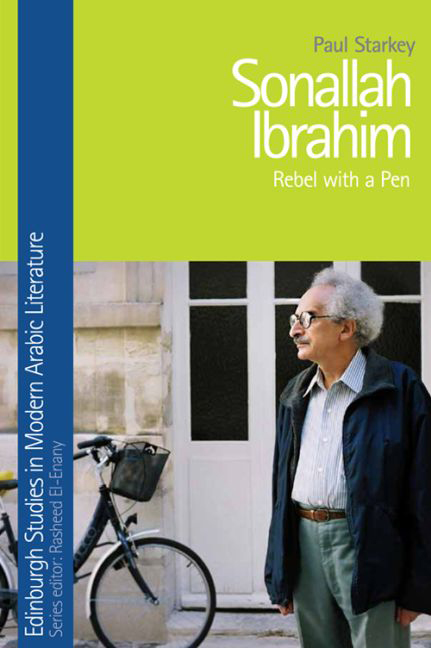Book contents
- Frontmatter
- Contents
- Series Editor's Foreword
- Preface
- 1 Introduction: Background and Context
- 2 Rebel with a Pen
- 3 Cairo Prison: Tilka al-raʾiha (1966)
- 4 Michelangelo and the Dam: Najmat Aghustus (1974)
- 5 CocaColaland: al-Lajna (1981)
- 6 War in Lebanon: Bayrut, Bayrut (1984)
- 7 Consumer Society: Dhat (1992)
- 8 Prison of Dishonour: Sharaf (1997)
- 9 Widening Horizons (1): Sex, Memory and Revolution: Warda (2000)
- 10 Widening Horizons (2): In the Land of the Capitalists: Amrikanli (Amri Kan Li) (2003)
- 11 Return to Childhood: al-Talassus (2007)
- 12 The French Connection: al-ʿImama wa-al-Qubbaʿa (2008) and al-Qanun al-Faransi (2008)
- 13 Filling a Gap: al-Jalid (2011)
- 14 Epilogue
- Bibliography
- Index
4 - Michelangelo and the Dam: Najmat Aghustus (1974)
Published online by Cambridge University Press: 23 September 2017
- Frontmatter
- Contents
- Series Editor's Foreword
- Preface
- 1 Introduction: Background and Context
- 2 Rebel with a Pen
- 3 Cairo Prison: Tilka al-raʾiha (1966)
- 4 Michelangelo and the Dam: Najmat Aghustus (1974)
- 5 CocaColaland: al-Lajna (1981)
- 6 War in Lebanon: Bayrut, Bayrut (1984)
- 7 Consumer Society: Dhat (1992)
- 8 Prison of Dishonour: Sharaf (1997)
- 9 Widening Horizons (1): Sex, Memory and Revolution: Warda (2000)
- 10 Widening Horizons (2): In the Land of the Capitalists: Amrikanli (Amri Kan Li) (2003)
- 11 Return to Childhood: al-Talassus (2007)
- 12 The French Connection: al-ʿImama wa-al-Qubbaʿa (2008) and al-Qanun al-Faransi (2008)
- 13 Filling a Gap: al-Jalid (2011)
- 14 Epilogue
- Bibliography
- Index
Summary
The ‘Second-work Crisis’
After publishing Tilka al-raʾiha, Sonallah Ibrahim, by his own admission, was in something of a dilemma as to what to do next. Speaking to Youssef Rakha in 2003, he explained that:
There is such a thing as the second-work crisis, when you've made a strong debut and you don't know how to live up to it. People invariably expect something stronger. Maybe this explains the shift in focus after Tilka Al-Ra'iha … In 1967 I actually completed another novel, written in the same vein. It was never published. I was on my way to Germany and didn't have time to look for a publisher. When I looked at it again I didn't feel it was the kind of thing with which to present myself to the reader, having made an initial impression. Then I had a topic, the High Dam, which preoccupied me completely from 1967, even before 1967, I think, until 1970 …
The work in question, entitled al-Riwaya (Story), remained unpublished, but a xeroxed copy of the typescript (faded and difficult to read) survives in Oxford and was discussed by Ali Jad in his Form and Technique in the Egyptian Novel. Dated Beirut, 19 August 1968, the seventy-one- page manuscript shows the author again employing the ‘telegraphic’ prose style of Tilka al-Ra ʾiha in a first-person narrative that, like his earlier work, to a considerable extent revolves around the narrator's unsatisfactory sexual relationships – the most significant of which here takes the form of an affair with his brother's wife. Although the work gives the impression of being perhaps a trifle less self-centred than Tilka al-raʾiha, however, and the relationships are less ephemeral and more sustained, al-Riwaya nonetheless does not suggest any major development either in the author's technique or in his use of thematic material, and several scenes suggest above all a desire to shock. All in all, it is hard to resist the conclusion both that the work is little more than a ‘rerun’ of Tilka al-raʾiha, and that, in terms of the development of his literary career, Sonallah Ibrahim was right not to pursue the publication further.
- Type
- Chapter
- Information
- Sonallah IbrahimRebel with a Pen, pp. 51 - 68Publisher: Edinburgh University PressPrint publication year: 2016



